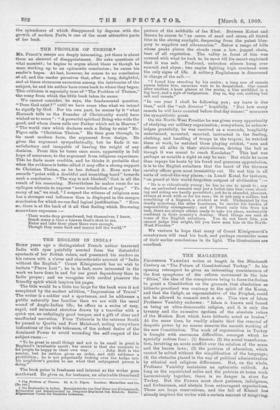THE PROBLEM OF THEISM.* Kn. Pxeou's essays are deeply interesting,
yet there is about them an element of disappointment. He asks questions of vital moment ; he begins to argue about them as though he were working up to an optimistic conclusion ; he raises his reader's hopes. At last, however, he comes to no conclusion :at all, and the reader perceives that, after a long, delightful, -and at times strenuous excursion among the intricacies of the :subject, be and his author have come back to where they began. This criticism is especially true of "The Problem of Theism," the essay from which the little book takes its name.
We cannot consider, he says, the fundamental question,
ig Does God exist P " until we have some idea what we intend to signify by God. For his own part, he means by it " what
Harnack tells us the Founder of Christianity would have 'wished. us to mean " : " A powerful spiritual Being who wills the -good, and whom Jesus calls our Father which art in Heaven." -" The world view which declares such a Being to exist " Mr. Pigon calls " Christian Theism." He then goes through, in its most modern form, the argument from design. He gives the argument sympathetically, but he finds it un- satisfactory and incapable of bearing the weight of any decision. From this he turns once more, apparently in full .hope of assurance, to the argument from religious experience.
This be finds more credible, and he thinks it probable that when the evidence is better sifted it may offer a strong support o Christian Theism, as he has defined it. Even now the .records "point with a doubtful and trembling hand" towards such a conclusion. "The way is not blocked," that is all the result of his reasoning. Nevertheless he makes room for an epilogue wherein to express "some irradiation of hope." "To :many of us," we read, "I suspect the witness of religious men has a stronger real influence than is displayed in the meagre -conclusion for which we can find logical justification." "Even .so, there is at the back of it all that feeling which Browning somewhere expresses :-
Their works drop groundward, but themselves, I know, Reach many a time a heaven that's shut to ins, Enter and take their place there sure enough, Though they come back and cannot tell the world.'"














































 Previous page
Previous page